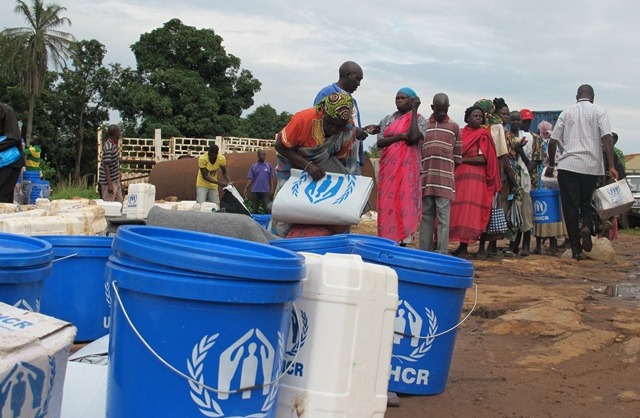International relief organizations decry lack of funds for operations in South Sudan

March 11, 2016 (NEW YORK) – Major international relief organizations providing humanitarian assistance to the vulnerable populations in South Sudan said there is lack of funding from donors in order to carry out their operations in the war-ravaged country.
After a joint briefing in New York where representatives of different organizations shared their experiences, a statement extended to Sudan Tribune, decried the gap between their proposed budgets and the actual money received from donors.
Chaired by Ahmad Fawzi, Director, United Nations Information Service in Geneva, the briefing was also attended by spokespersons of the Office of the High Commissioner for Human Rights, the United Nations Children’s Fund, the Office for the Coordination of Humanitarian Affairs, the United Nations Refugee Agency, the International Organization for Migration, the International Labour Organization, and the World Health Organization.
Christophe Boulierac, spokesperson for the United Nations Children’s Fund (UNICEF), said humanitarian funding for the world’s youngest country had collapsed, putting the lives of tens of thousands of children at risk.
“For the first time since the start of the crisis, which was now in its third year, children were being threatened not only by a lack of access or capacity, but really by a lack of funds. For South Sudan, UNICEF was facing a gap of some USD 128 million for 2016. In other words, only 18 per cent of the appeal for South Sudan had been received so far,” he revealed.
He said the implications of the funding gap were extremely concrete, explaining that “essential nutrition supplies would run out in August 2016, 3.3 million children would not be vaccinated against measles, the efforts to reunite 7,300 children with their families would be halted, and 260,000 children affected by conflict would not be supported to return to school.”
The peak of the lean season in May, he added, would bring with it the threat of famine to over 40,000 people in central Unity state, heavily affected by violence.
He also reminded that fighting had spread to previously peaceful areas in the west of the country, including Wau and Western Equatoria, where UNICEF had not been planning initially to provide a life-saving emergency response.
“In addition to those urgent needs, there was also alarm over the growing number of poor urban families struggling to eat even one meal a day due to skyrocketing food prices. In Juba, child malnutrition rates were three times higher than in surrounding rural areas.”
He decried that South Sudan was becoming a forgotten emergency by donors, threatening the lives of tens of thousands of children.
Jens Laerke, for the Office for the Coordination of Humanitarian Affairs (OCHA), said that their organization’s overall humanitarian response plan for South Sudan, of USD 1.3 billion, was only 7.8 per cent funded overall “as of today.”
“It had been launched in December 2015, and a gap of USD 1.2 billion remained. There were an estimated 6.1 million people in need of protection and humanitarian assistance across South Sudan. The central emergency response fund had given an injection of USD 15 million, including to Unity State, where there was a risk of food insecurity and even famine,” Laerke said.
He added that an amount of $100 million that had been contributed to the appeal had come partly from carry over, saying the top five countries having provided the new funding were Germany, the United Kingdom, Denmark, the United States and Ireland.
The spokesman, for the United Nations Refugees Agency (UNHCR), Leo Dobbs, on the other hand said fighting had spread to previously peaceful areas in South Sudan, causing thousands of people to flee into the Democratic Republic of the Congo, Uganda and even the Central African Republic.
UNHCR, the official said, was hoping to gain access in the week of 14 March to an estimated 7,000 South Sudanese refugees living in desperate conditions in Bambouti, located in a difficult to reach area in the easternmost part of Central African Republic.
The new fighting in Western Equatoria had since late 2015 also forced more than 11,000 people to cross into Democratic Republic of the Congo and seek shelter in the towns of Doruma, Bangalu, Gangala, Duru and Bitma.
In Uganda, more than 14,000 South Sudanese refugees, the vast majority of whom were women and children under the age of 18, had been registered since the start of the year.
Many of the new arrivals, the statement added, were fleeing from Western Equatoria, often having walked for days, and were tired, hungry and in need of help.
Over 2 million South Sudanese have been displaced due to the ongoing conflict while nearly 7 million others are food insecure.
(ST)
